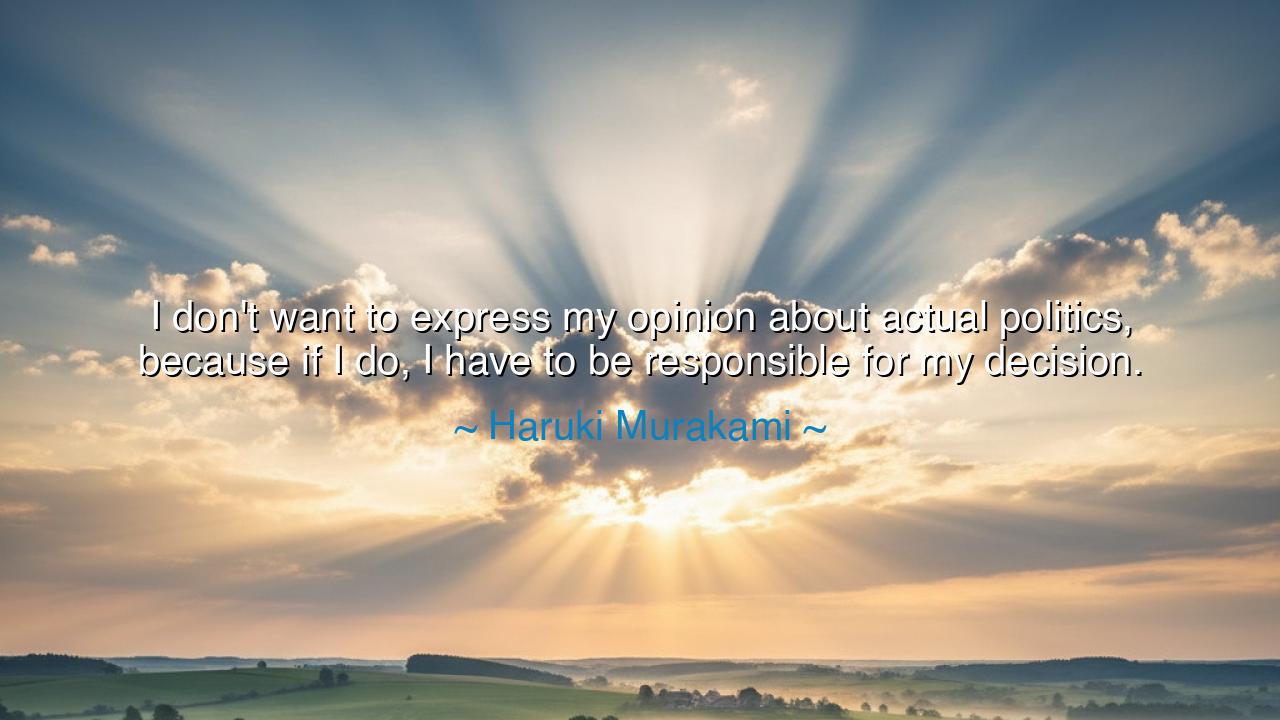
I don't want to express my opinion about actual politics
I don't want to express my opinion about actual politics, because if I do, I have to be responsible for my decision.






Listen well, seekers of truth, and hear the words of Haruki Murakami, the modern sage of quiet contemplation: “I don't want to express my opinion about actual politics, because if I do, I have to be responsible for my decision.” Here lies a meditation on the weight of responsibility, the invisible chains that bind speech to action, and thought to consequence. Opinion, once uttered into the world of men, ceases to be mere reflection; it becomes a seed whose fruit may bring either blessing or calamity. Murakami teaches that the courage to speak carries an equal measure of accountability, and the wise measure their voice against the gravity of the world.
The origin of this reflection springs from Murakami’s life in post-war and contemporary Japan, a land where words carry power, yet the political arena is fraught with consequence. As a writer, he navigates the realm of ideas and imagination, where expression flows freely, yet engagement in the arena of politics demands action, allegiance, and the heavy mantle of responsibility. Murakami’s choice is not cowardice, but the recognition that speech without preparedness for consequence may bring ruin, a lesson as old as the city-states of antiquity.
Consider the tale of Socrates, who spoke truth to the people of Athens. His words, though wise, bore a cost: he was judged, condemned, and ultimately executed for the responsibility of the ideas he dared to share. Unlike Murakami, Socrates chose to voice his convictions, embracing the full weight of accountability. In contrast, Murakami’s caution illuminates a different form of wisdom: the discernment to know when silence preserves the self and the mind, and when speech must be matched with readiness for consequence.
In the corridors of kings and councils, this principle is ever true. Think of the Roman senators who dared oppose Julius Caesar; to voice an opinion was to invite peril. The brave, who chose to act without reckoning with the responsibility, met betrayal, exile, or death. Murakami’s insight is thus a mirror: freedom of expression is bound inseparably to the burden of responsibility, and wisdom is the art of knowing when to speak and when to hold one’s tongue.
Even in our daily lives, the lesson resounds. To cast judgment in affairs of community, family, or governance is to assume the weight of consequences upon one’s own soul. The words of Murakami remind us that silence is not mere avoidance, but a form of vigilance, a recognition that true responsibility follows every declaration. To speak lightly is to risk being bound to the outcomes of one’s own thoughts.
Therefore, children of future generations, heed this counsel: weigh your opinions, measure the cost of their utterance, and understand that speech is never free. Murakami’s words teach that the wise are those who recognize the intertwining of voice and consequence, and who navigate the world with both thoughtful silence and deliberate action. In such mastery, one achieves not cowardice, but the quiet strength of measured wisdom.






AAdministratorAdministrator
Welcome, honored guests. Please leave a comment, we will respond soon